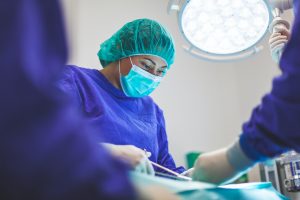 The medical machining services industry plays a vital role in the manufacture of medical devices around the globe. Medical machining companies offer such services that encompass an extensive range of capabilities—from choosing the optimal material for an application; high volume production runs to prototyping, quality control, and product development. Unlike other machining services, parts and components for medical applications necessitate precision machining techniques that require verification and validation through every phase of production. This is due entirely to the inherent nature of the products produced by the industry.
The medical machining services industry plays a vital role in the manufacture of medical devices around the globe. Medical machining companies offer such services that encompass an extensive range of capabilities—from choosing the optimal material for an application; high volume production runs to prototyping, quality control, and product development. Unlike other machining services, parts and components for medical applications necessitate precision machining techniques that require verification and validation through every phase of production. This is due entirely to the inherent nature of the products produced by the industry.
Medical devices must meet stringent regulatory requirements that are manufactured to exacting specifications. For any medical application, parts and components must not only be durable but made with precision and accuracy to fulfill requirements. Manufacturers use precision CNC machining to meet the challenges of producing extremely detailed medical parts, with a high level of consistency. Each part or component must be accurate, reliable, safe, and approved for one-time applications or long-term use.
In either case, precision machining is required to produce the highest quality part. Precision machining uses CAD/CAM engineering software to design products and to operate equipment and machinery. CNC cutters, die cutting, CNC routers, laser cutters, and other precision tooling can produce intricate and complex designs once unheard of, provide tight tolerances where required and dimensional stability, all the while offering exceptional accuracy and repeatability for short or long production runs.
Material selection is essential in medical machining services. Medical parts and components utilize a broad range of specially suited materials for medical and health-related applications. Chief among these materials are medical-grade plastics—polymers formulated explicitly for applications in the healthcare industry. These types of plastics have properties that make their application for medical devices ideal—antimicrobial, durability, elasticity, high tensile strength, and so on. Common thermoplastic or thermoset plastic materials used in medical device applications include polycarbonate, Teflon, PVC, polypropylene, and silicone (among many others). Product applications for medical-grade plastics are endless and offer a combination of low costs and manufacturability. They have long replaced equipment and devices once made of such material as ceramics, steel, or glass.
To ensure high standards of production and produce the highest quality components, medical machining services integrate quality control processes at every level of production. This includes the receiving of material, FAI (First Article of Inspection), engineering and operational services, and quality management systems that adhere, report, and meet ISO 9001 standards. Quality control protocols improve upon the products and services provided to customers, guarantee traceability in manufacturing and testing processes, maintain high levels of consistency, improve process validation, ensure products are developed to meet regulatory standards and approval through every stage of prototyping development.
Another role instrumental to medical machining services is the one it plays in prototyping and product development. Prototyping is a primary function in any product’s development and exceptionally important in medical machining services. Device prototypes are used to develop, test, and visually assess product performance and proof of concept through each stage of advancement. More importantly, medical devices must adhere to stringent validation and verification processes through each phase of product development to be awarded FDA approval. These phases of development are referred to as process validation. FDA defines process validation as a means to establish through “objective evidence that a process consistently produces a result or product meeting its predetermined specifications.” Prototyping and product development capabilities in medical machining services allow designers and engineers to make any changes and modifications as necessary during the process to ensure the device meets the validation and verification before pre-submission of the device to the FDA.
Precision machining of medical parts is essential for the production of reliable, high-quality medical devices. Medical machining services utilize CNC machines and other technologies to produce extremely intricate components and parts with precision, accuracy, repeatability, and durability needed to manufacture medical devices. Machining services also provide customers with expertise in material selection, regulatory guidance, prototyping, and product development to provide customers with an end product they can depend on for durability and precision performance.
